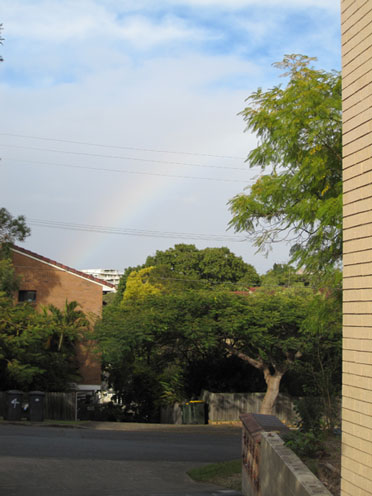Connections are Key
Add Summary

Blogger: Abigail Lynch, a doctoral candidate in the Department of Fisheries and Wildlife and a CSIS member, blogs from Down Under -- she's in Australia to build a framework for her dissertation research. She's interested in developing a decision-support tool to regulate harvest management strategies for lake whitefish in a changing climate.
Connections are Key
Friday, July 1, 2011
Much to my astonishment, it actually can rain in Brisbane in the winter! Enough to create a beautiful rainbow that greeted me as I left my apartment this morning, but not enough to alter my plans in any way.
I was headed out to meet John Glaister, deputy director-general, health planning and infrastructure with Queensland Health, who is also a wine connoisseur and longtime friend and colleague of Bill Taylor, for lunch on the river at Rugby Quay. Over the course of the delicious, informative, and entertaining lunch, it was never more evident to me the importance of personal,professional networks. They are the key to catalyzing collaboration and, for better or worse, they are how things get done. In the arena of natural resource management, these personal networks are, perhaps, the ultimate coupled human- natural system -- they are the links between humans studying and managing natural resources. I was fortunate enough to meet John through my association with Bill Taylor; through my lunch with John, my connections again have multiplied. By the time I had taken the ferry back to UQ, he had already e-introduced me to a number of colleagues of his in Hobart and set me up to meet with them when I visit later this month!
Queensland Health, who is also a wine connoisseur and longtime friend and colleague of Bill Taylor, for lunch on the river at Rugby Quay. Over the course of the delicious, informative, and entertaining lunch, it was never more evident to me the importance of personal,professional networks. They are the key to catalyzing collaboration and, for better or worse, they are how things get done. In the arena of natural resource management, these personal networks are, perhaps, the ultimate coupled human- natural system -- they are the links between humans studying and managing natural resources. I was fortunate enough to meet John through my association with Bill Taylor; through my lunch with John, my connections again have multiplied. By the time I had taken the ferry back to UQ, he had already e-introduced me to a number of colleagues of his in Hobart and set me up to meet with them when I visit later this month!
Lynch's studies are supported by a William W. and Evelyn M. Taylor Endowed Fellowship for International Engagement in Coupled Human and Natural Systems, an International Studies and Programs Predissertation Award, an Ecology, Evolutionary Biology, and Behavior Summer Fellowship, a Graduate School Research Enhancement Award, and a travel award from the College of Agriculture and Natural Resources.



 Print
Print Email
Email





